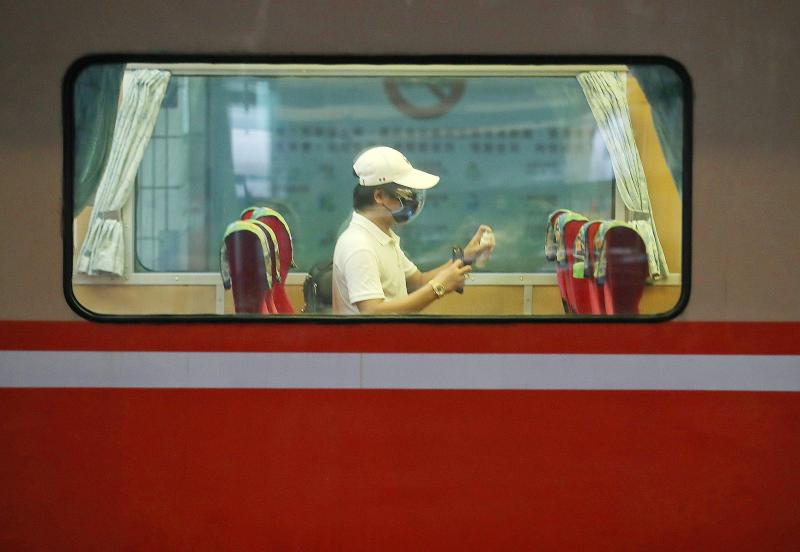The Taiwan Railways Administration (TRA) has proposed that retail stores at railway stations be allowed to pay half their rent and royalties to weather challenges caused by a nationwide level 3 COVID-19 alert.
Ridership on railway services has declined dramatically as people have been encouraged to stay at home as much as possible under the alert. This has hurt retail stores and restaurants at railway stations, which depended heavily on business generated by foot traffic.
Some lawmakers at a meeting of the legislature’s Finance Committee on Tuesday seconded a motion asking the TRA to consider reducing the rent and other expenses for retail stores at railway stations.

Photo courtesy of the Taiwan Railways Administration
TRA Director-General Du Wei (杜微) on Tuesday afternoon inspected the Taipei and Nangang railway stations, and spoke with some managers of retail stores and restaurants who are trying to generate more revenue by working with food delivery services or giving discounts to people ordering takeout.
They told him that their revenues over the past four weeks only accounted for 10 to 30 percent of revenues prior to the level 3 alert, the TRA said, adding that some of the stores have temporarily suspended operations.
“While the agency did not receive any relief funds from the government this time, we will follow the motion proposed by lawmakers to help businesses weather this difficult time,” Du said.

Photo: CNA
The agency’s proposal says that businesses at railway stations would only be required to pay half their rent and royalties from May 15 to Aug. 31, while the rent from this month through August can be paid in September.
The Ministry of Transportation and Communications must approve the proposal before it can be implemented.

CHANGING LANDSCAPE: Many of the part-time programs for educators were no longer needed, as many teachers obtain a graduate degree before joining the workforce, experts said Taiwanese universities this year canceled 86 programs, Ministry of Education data showed, with educators attributing the closures to the nation’s low birthrate as well as shifting trends. Fifty-three of the shuttered programs were part-time postgraduate degree programs, about 62 percent of the total, the most in the past five years, the data showed. National Taiwan Normal University (NTNU) discontinued the most part-time master’s programs, at 16: chemistry, life science, earth science, physics, fine arts, music, special education, health promotion and health education, educational psychology and counseling, education, design, Chinese as a second language, library and information sciences, mechatronics engineering, history, physical education

The High Prosecutors’ Office yesterday withdrew an appeal against the acquittal of a former bank manager 22 years after his death, marking Taiwan’s first instance of prosecutors rendering posthumous justice to a wrongfully convicted defendant. Chu Ching-en (諸慶恩) — formerly a manager at the Taipei branch of BNP Paribas — was in 1999 accused by Weng Mao-chung (翁茂鍾), then-president of Chia Her Industrial Co, of forging a request for a fixed deposit of US$10 million by I-Hwa Industrial Co, a subsidiary of Chia Her, which was used as collateral. Chu was ruled not guilty in the first trial, but was found guilty

DEADLOCK: As the commission is unable to forum a quorum to review license renewal applications, the channel operators are not at fault and can air past their license date The National Communications Commission (NCC) yesterday said that the Public Television Service (PTS) and 36 other television and radio broadcasters could continue airing, despite the commission’s inability to meet a quorum to review their license renewal applications. The licenses of PTS and the other channels are set to expire between this month and June. The National Communications Commission Organization Act (國家通訊傳播委員會組織法) stipulates that the commission must meet the mandated quorum of four to hold a valid meeting. The seven-member commission currently has only three commissioners. “We have informed the channel operators of the progress we have made in reviewing their license renewal applications, and

Taiwan-based publisher Li Yanhe (李延賀) has been sentenced to three years in prison, fined 50,000 yuan (US$6,890) in personal assets and deprived political rights for one year for “inciting secession” in China, China's Taiwan Affairs Office spokesman Chen Binhua (陳斌華) said today. The Shanghai First Intermediate People’s Court announced the verdict on Feb. 17, Chen said. The trial was conducted lawfully, and in an open and fair manner, he said, adding that the verdict has since come into legal effect. The defendant reportedly admitted guilt and would appeal within the statutory appeal period, he said, adding that the defendant and his family have